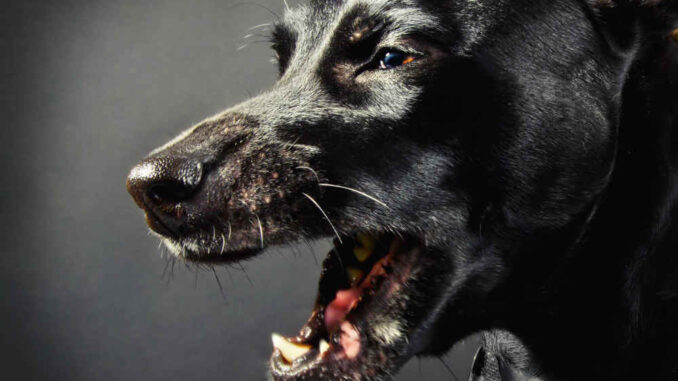
This article was updated on May 1st, 2023

There have been a few times when a dog has come into my clinic coughing up blood. If you ever have a dog that is coughing up blood, they need to see your vet or a local ER vet as soon as possible. While this could be nothing to worry about many times, this can indicate that there is something severe going on that needs medical attention right away.
What Does It Look Like When a Dog Coughs Up Blood?
There are many different looks of blood that your dog could be coughing up.
- Bright red blood: If your dog is coughing up bright red blood, this indicates that the blood is fresh and undigested. This could mean that there is a cut in their mouth that is bleeding or a bleed in the upper airways.

- Dark coffee-colored blood: Bloody vomit that is a dark red or black – almost coffee-ground color – usually indicates that your dog has a gastric ulcer.
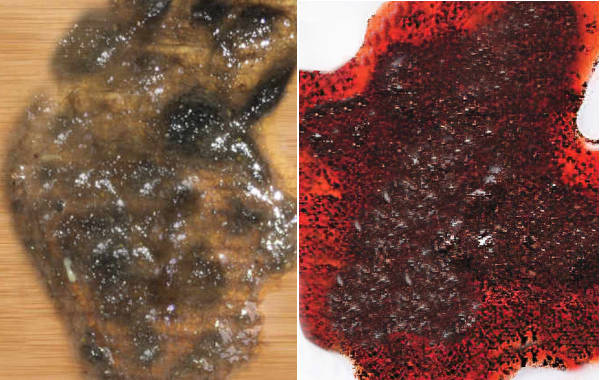
- Blood with worms: Some dogs may cough up blood with worms in them. This may be heartworms or intestinal parasites.
- Blood clots or specks of blood: If your dog is coughing up clotted blood, this could mean that they have been bleeding for a little time.
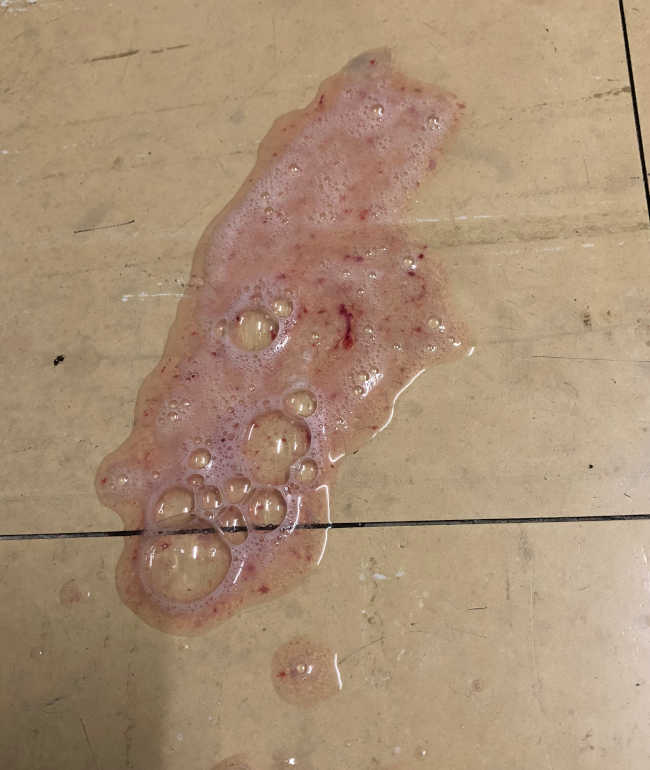
- Frothy blood: Dogs coughing up frothy blood may have congestive heart failure or severe lung disease.
The look and type of blood that your dog is coughing up can help your vet determine what is causing your dog to vomit. Pictures are always very helpful. While it may be gross, taking a picture of the blood that your dog is coughing up will help your vet quickly determine what is causing your dog to cough up blood.
Is My Dog Suffering? Is It Serious?
Vomiting blood can be life-threatening. While your dog may not be in pain after they vomit blood, this would indicate that they have an underlying issue that is going on that really needs to see your vet. Some dogs may be bleeding internally and need surgery right away, or they may need medications to help with their breathing and reduce vomiting.
Top 4 Reasons Causing A Dog To Cough Up Blood
These are the top 4 reasons that can cause your dog to cough up blood.
- End-stage heartworm disease
If your dog has heartworms, these worms will swim around in your dog’s heart, vessels and lungs. This can cause a lot of damage to these organs. Many times, if your dog has a large load of heartworms, it can cause your dog to hack and cough. Many times, dogs with end-stage heartworm disease may be coughing and vomiting up blood. This is also known as caval syndrome and is often a fatal condition.
If your dog does have caval syndrome, the most common treatment is surgically removing the heartworms from your dog’s vena cava. This is the main blood vessel that brings blood back to your dog’s heart. This type of surgery is often very risky and only done at a specialty clinic. The cost of this treatment can reach up to $3,000 to $5,000+ since most of these procedures and treatments need to be done at a specialty clinic.
2. Mass in the lungs that has ruptured
Cancer and other masses can occur in your dog’s lungs, especially as they get older. If these masses rupture, it can cause your dog to cough up blood. If your dog does have a mass in their lungs, it would be best for them to see your vet. Your vet will want to take x-rays to see the size and severity of these masses.
If your dog has a mass in their lungs, there may be surgery that can be done to remove the mass or chemotherapy to help decrease the size of these masses. Surgery to remove these masses and/or chemotherapy can be very expensive. Some surgeries can cost 3,000+. Chemotherapy often reaches $7,000 to 10,000 in some cases.
3. Severe respiratory infection
Some dogs can develop severe respiratory infections such as pneumonia. This can cause your dog to cough and hack. After a while, it can cause damage and inflammation to your dog’s lungs. This can cause your dog to cough up blood. This blood is usually bright red since the blood has not been digested. If you catch this infection early in the course of the disease, it can easily be treated with some antibiotics. For mild respiratory issues, steam from a hot shower or antihistamines can help. If the infection persists, they will need to see your vet. This disease can have a large cost range depending on when you catch the respiratory issue. A good range is $200 to $1500+.
4. Gastro-intestinal (GI) ulceration
If your dog is coughing up blood that looks like brownish coffee grounds, this can be because your dog has a GI ulcer. Dogs vomiting or suffering from GI infections can develop ulcers.
This is when the lining of the stomach or intestines has become very thin, causing an ulcer that is bleeding. This blood can come up when your dog coughs or vomits. GI ulcers can improve with medications from your vet.
In some dogs, these ulcers can cause a perforation in the stomach where food contents can leak into their abdomen, causing an infection. Dogs with perforated stomachs will need surgery to repair the defects. The surgery cost can be upwards of $4 to $5,000. If you catch GI ulcers before rupture, medical treatment may only be $300 to $500+.
3 Steps You Can Take at Home to Help Your Dog
Many times if your dog is coughing up blood or vomiting up blood, it is best for your dog to see a vet right away. Sometimes there are some things that can be done at home such as:
- Feeding a bland diet such as chicken and rice. This can help your dog if they are coughing up blood because of a GI issue.
- Allow your dog to rest in a warm area away from other pets.
Medications should only be given after you talk with your vet. It is best to also monitor your dog for any other health issues, and if you notice that your dog is not acting normal or coughing up blood more than once, you should see your vet.
When Should I Call the Vet?
Dogs coughing or vomiting blood should see an ER vet right away. Many times, this indicates a very severe issue that really should be investigated.
These are some other signs that you may notice that would indicate you do not need to try any at-home treatment and really need to go to the vet right away.
- Your dog is continuing to cough or vomit blood
- Your dog’s gums are pale or blue
- Your dog is having issues breathing
- Your dog is not eating or drinking
- Your dog is extremely lethargic.
All of these are severe issues and should be seen by a vet right away. If you postpone vet care when you notice these other health issues can be life-threatening for your dog.
Vet Diagnosis
Your vet will run bloodwork and take x-rays or ultrasounds to see what is causing them to cough up blood. They may also want to test your dog for heartworms, especially if they are not taking heartworm prevention and are in an area that is known for heartworm disease.
After they figure out what is causing your dog to continue to cough up blood, they will be able to treat your dog. This may be heartworm treatment, surgery, or medication to help treat any infection that your dog may be experiencing.
Prognosis
Many of these issues causing your dog to cough up blood can be life-threatening. Respiratory issues can usually be treated and do not always carry a poor prognosis.
What you Should Know Before the Vet Visit
When you are preparing for your vet visit, taking pictures of the blood that your dog has coughed or vomited will help your vet determine what is causing these issues. It is also great to keep your dog calm and not allow them to continue to exhaust themselves by playing.
FAQ with the Vet
Are certain breeds more likely to be affected?
Small dogs are more prone to developing heart disease. All dogs can develop heartworms, respiratory issues, and GI ulcers.
Is it ok to give my dog Benadryl?
You should not give your pet any medications without checking with their vet. Benadryl can be safe for some dogs, but it can be harmful to others.
Final Thoughts
Coughing up blood is not something that should be taken lightly. This can mean that your dog has a severe medical issue that needs to be seen and treated by a vet right away. It is never a bad idea to take your dog immediately to a vet if your dog is coughing up blood.
Disclaimer: This website's content is not a substitute for veterinary care. Always consult with your veterinarian for healthcare decisions. Read More.

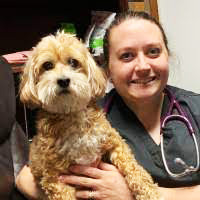
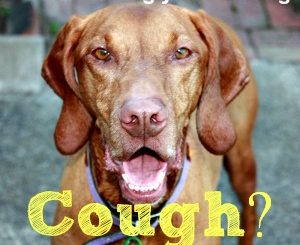


Be the first to comment